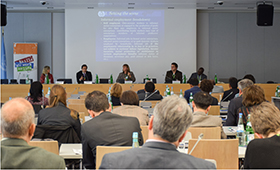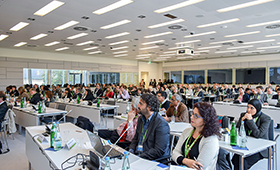Vocational education and training – Master key for the future
UNEVOC Global Forum "Skills for Work and Life – Post 2015"
06.05.2015
The main topics of the UNEVOC Global Forum „Skills for Work and Life – Post 2015“ in Bonn from 14 to 16 October 2014 were employability of young people and sustainable development.

More than 200 delegates from over 70 countries attended the conference that was organised by UNEVOC, the GIZ and the BIBB. The forum highlighted the importance of vocational education and training in view of global challenges.
Transition from school to a career: early information indispensable
How to facilitate the transition from the education system to the formal employment market? Which areas offer potential for improvement? And in how far is the large number of gainfully employed people in the informal sector in many emerging nations an indicator for the failure of transitional processes? These were some of the issues addressed during the panel discussion "School-to-work transitions – perspectives from the formal and informal sectors" involving the panellists Birgit Thomann, Head of Department at the BIBB, Diego Rei from the International Labour Organization (ILO), Christian Bryzinsky-Fay from the Social Science Research Center Berlin (WZB), John Simiyu from the University of Eldoret (Kenya) and Marie-Josee Fortin from International Partnerships, Colleges and Institutes in Canada.
The discussion highlighted the recognition of informal learning as well as the shared responsibility of the public and private sectors as the most important conditions and success factors for a successful transition from school to the labour market. The panellists agreed that another important factor is the timely start of occupational orientation at an early stage and not at the time of transitioning into gainful employment. "The early gathering of information and occupational orientation is indispensable because of the numerous challenges in the transition from school to the working world", said Birgit Thomann from the BIBB.
"The early gathering of information and occupational orientation is indispensable because of the numerous challenges in the transition from school to the working world." (Birgit Thomann, BIBB)
Support in choosing a career: the BIBB's Vocational Orientation Programme

The "Supporting vocational orientation in inter-company vocational training centres and comparable VET centres" (BOP) programme that was launched in 2008 and is supported by the BIBB has been designed to help pupils develop an idea of career prospects and to thus counteract disinterest in school and apprenticeship dropouts. Angelika Puhlmann from the BIBB demonstrated on the basis of promising practical examples how young people's career entry prospects can be improved and how they can be introduced to vocational qualifications in different regional and national contexts. She said that occupational guidance is an important part of general education in Germany. All pupils should attain competences that facilitate their decision for a suitable occupation. This, she said, enables the successful transition from school into an apprenticeship and later into gainful employment.
Green Technical Vocational Education and Training (TVET): a remedy to combat youth unemployment?
The participants of the "Teaching, learning and training green TVET" workshop engaged in an exchange regarding the opportunities for increasing the competitive capability of businesses by way of sustainable economic management, thereby improving the labour market prospects of young people in particular. Can sustainable economic management make a contribution towards lowering the global youth unemployment rates? The experts agreed that this is possible. The condition for this are sufficient numbers of appropriately trained professionals. Therefore, the objective should be to integrate the topic of sustainable development in the teaching provision, in lifelong learning and the vocational education and training provision.
Green TVET expert Dagmar Winzier (BIBB/UNEVOC) presented the UNESCO-UNEVOC activities in this field. In her lecture, she demonstrated how sustainable action could be integrated into vocational education and training throughout the world. She used concrete examples, partly deriving from the BIBB "Vocational education and training for sustainable development" model tests, to explain how the transformation towards a sustainable economy could be achieved by way of new forms of employment and which competences are required to this end.
UNEVOC conference important contribution to vocational education and training networking
The "Skills for Work and Life – Post 2015" conference made an important contribution to the global networking of experts in the field of vocational education and training with more than 200 representatives of education organisations from over 70 countries attending the event.
"Vocational education and training is not only the key, but the master key to meet the challenges of demographic change, of sustainable development and of employability of young people worldwide." (Prof. Reinhold Weiß, BIBB)

Prof. Reinhold Weiß, Deputy President and Head of Research at the BIBB, succinctly summarised the conference result in his closing remarks: "Vocational education and training is not only the key, but the master key to meet the challenges of demographic change, of sustainable development and of employability of young people worldwide." Shyamal Majumdar, Head of the UNESCO-UNEVOC International Centre for Technical and Vocational Education and Training, was likewise highly satisfied with the event. "Coming together is the beginning, planning together is progress and working together is success. Now it is time to implement this vision into concrete interventions and actions for the development of vocational education and training worldwide", said Majumdar.